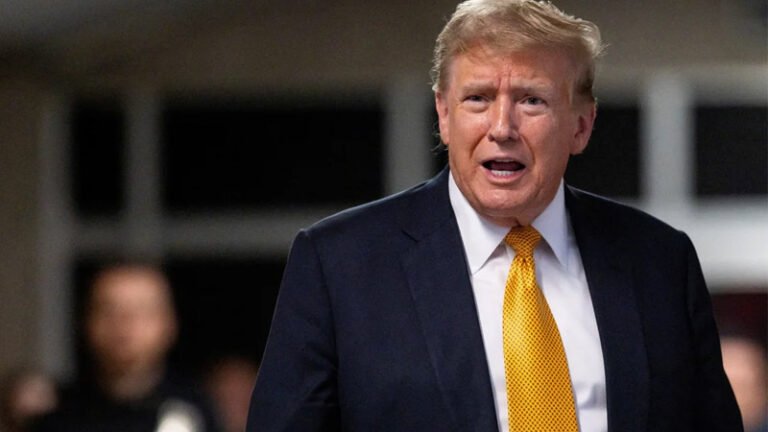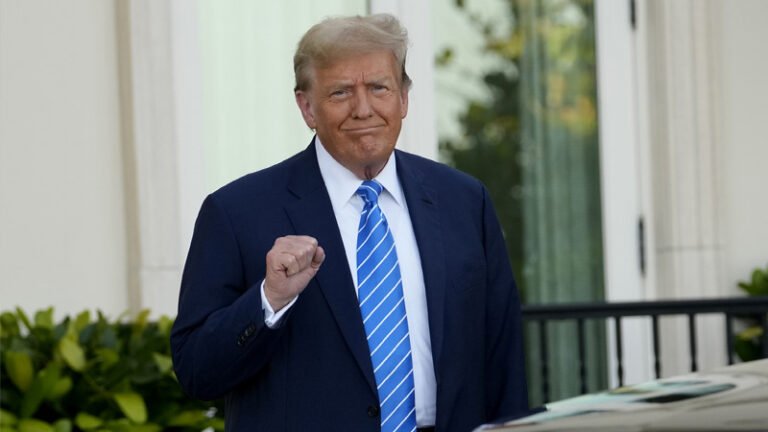
Photo Credit : Dinner ,Saul Loeb/Getty Images
Former President Donald Trump sparked controversy during a press conference on Thursday, August 8, 2024, when he accused a reporter of asking a “stupid question” regarding his recent campaign activities.
According to a Video from Fox News on X, formerly known as Twitter, the exchange occurred when a reporter inquired about Trump’s lack of public campaign events in the past week.
Trump responded dismissively, stating, “What a stupid question. Because I’m leading by a lot and I’m letting their convention go through. I’m campaigning a lot. I’m doing tremendous amounts…”
The incident took place during a news conference at Trump’s Mar-a-Lago residence, where he had announced plans to address the media. report from CNN.
Trump’s response left the reporter momentarily speechless, highlighting the often tense relationship between the former president and members of the press.
This exchange comes amid a series of controversial statements and actions by Trump in recent weeks, including the alleged sharing of a racially charged image of Vice President Kamala Harris on his Truth Social platform.
The image in question reportedly depicted Harris with darkened skin and the body of a dung beetle, sparking outrage and condemnation from various quarters.
Critics have described the altered image as racist, noting that darkening the skin tone of Black individuals is considered a racist act.
The timing of these incidents is particularly noteworthy, as they occur in the lead-up to the 2024 presidential election, where Trump is expected to face off against Harris.
Trump’s comments and actions have reignited discussions about the role of social media in political discourse and the challenges of content moderation on platforms like Truth Social.
The former president’s history of controversial statements about race and identity has been a point of contention throughout his political career. NBC News.
During the press conference, Trump also proposed three debates with Harris, signaling his readiness to engage in direct confrontations with his potential opponent.
The suggestion of debates comes as both campaigns gear up for what is expected to be a highly contentious election season.
Trump’s recent appearances and statements have drawn criticism from various political figures and commentators, who argue that such rhetoric detracts from substantive policy discussions.
The Harris campaign has not yet issued an official response to Trump’s recent comments or the proposed debates.
Political analysts suggest that Trump’s tactics may be an attempt to divert attention from policy issues to more divisive racial narratives.
The incident has also raised questions about the impact of such confrontational approaches on voter perception and the overall tone of the upcoming presidential campaign.
Many observers are calling for a return to policy-focused debates and a move away from personal attacks and inflammatory rhetoric.
The use of memes and altered images in political discourse has become increasingly common in recent years, but the nature of the Harris image has crossed a line for many.
Some political commentators have suggested that such tactics may backfire, potentially galvanizing support for Harris among her base.
The incident has also sparked discussions about the intersection of free speech and hate speech on social media platforms.
Many are questioning the ethics of sharing such content, regardless of one’s political affiliations.
The role of fact-checking and content moderation on platforms like Truth Social has come under scrutiny in light of these recent events.
Some have called for stricter guidelines and more robust enforcement mechanisms to prevent the spread of racist or offensive content.
The incident has also reignited debates about the impact of social media on political polarisation in the United States.
Many worry that such posts and confrontational exchanges contribute to an increasingly toxic political environment.
The use of racial imagery and confrontational tactics in political attacks has a long and troubling history in American politics.
This latest incident is seen by some as a continuation of that problematic tradition.
The reaction to Trump’s recent statements and actions has been swift and varied, with condemnation coming from across the political spectrum.
Some political strategists question the wisdom of such tactics, suggesting they may alienate moderate voters.
The long-term implications of these incidents for the 2024 presidential campaign are yet to be fully understood.
Some fear it may set the tone for an increasingly acrimonious and divisive election season.
As the 2024 presidential campaign continues to unfold, incidents like these are likely to remain a point of intense debate and scrutiny.
The impact on public discourse and the overall health of American democracy remains a concern for many observers and citizens alike.





